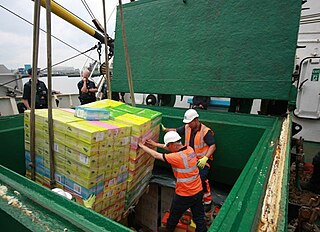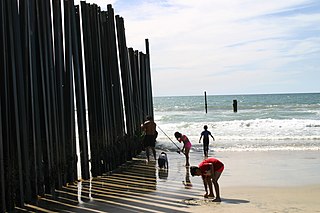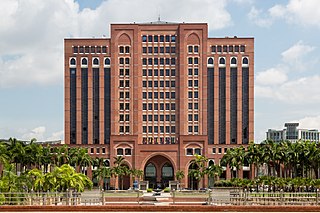
Smuggling is the illegal transportation of objects, substances, information or people, such as out of a house or buildings, into a prison, or across an international border, in violation of applicable laws or other regulations. More broadly, social scientists define smuggling as the purposeful movement across a border in contravention to the relevant legal frameworks.

People smuggling, under U.S. law, is "the facilitation, transportation, attempted transportation or illegal entry of a person or persons across an international border, in violation of one or more countries' laws, either clandestinely or through deception, such as the use of fraudulent documents".

The United Nations Office on Drugs and Crime is a United Nations office that was established in 1997 as the Office for Drug Control and Crime Prevention by combining the United Nations International Drug Control Program (UNDCP) and the Crime Prevention and Criminal Justice Division in the United Nations Office at Vienna, adopting the current name in 2002.

Illegal entry is the act of foreign nationals arriving in or crossing the borders into a country in violation of its immigration law. Human smuggling is the practice of aiding people in crossing international borders for financial gain, often in large groups. Human smuggling is associated with human trafficking. A human smuggler will facilitate illegal entry into a country for a fee, but on arrival at their destination, the smuggled person is usually free. Trafficking involves physical force, fraud, or deception to obtain and transport people, usually for enslavement or forced prostitution.

Human trafficking is the trade of humans for the purpose of forced labour, sexual slavery, or commercial sexual exploitation.

The Ministry of Home Affairs, abbreviated KDN, MOHA, is a ministry of the Government of Malaysia that is responsible for home affairs: law enforcement, public security, public order, population registry, immigration, foreign workers, management of societies, anti-drug, publication / printing / distribution of printed materials, film control, management of volunteer, rehabilitation and implementation of punishment.
Indonesia is a source, transit, and destination country for women, children, and men trafficked for the purposes of commercial sexual exploitation and forced labor. The greatest threat of trafficking facing Indonesian men and women is that posed by conditions of forced labor and debt bondage in more developed Asian countries and the Middle East.
Libya is a transit and destination country for men and women from sub-Saharan Africa and Asia trafficked for the purposes of forced labor and commercial sexual exploitation. While most foreigners in Libya are economic migrants, in some cases large smuggling debts of $500–$2,000 and illegal status leave them vulnerable to various forms of coercion, resulting in cases of forced prostitution and forced labor.

Human trafficking in Australia is illegal under Divisions 270 and 271 of the Criminal Code (Cth). In September 2005, Australia ratified the Protocol to Prevent, Suppress and Punish Trafficking in Persons, especially Women and Children, which supplemented the United Nations Convention against Transnational Organized Crime. Amendments to the Criminal Code were made in 2005 to implement the Protocol.

In the United States, human trafficking tends to occur around international travel hubs with large immigrant populations, notably in California, Texas, and Georgia. Those trafficked include young children, teenagers, men, and women; victims can be domestic citizens or foreign nationals.
Bangladesh is a source and transit country for men, women, and children subjected to trafficking in persons, specifically forced labor and forced prostitution. A significant share of Bangladesh's trafficking victims are men recruited for work overseas with fraudulent employment offers who are subsequently exploited under conditions of forced labor or debt bondage. It also includes the trafficking of children – both boys and girls – within Bangladesh for commercial sexual exploitation, bonded labor, and forced labor. Some children are sold into bondage by their parents, while others are induced into labor or commercial sexual exploitation through fraud and physical coercion. Women and children from Bangladesh are also trafficked.

In 2009, Papua New Guinea was a source, destination, and transit country for men, women, and children subjected to trafficking in persons, specifically forced prostitution and forced labor. Women and children were subjected to commercial sexual exploitation and involuntary domestic servitude; trafficked men were forced to provide labor in logging and mining camps. Children, especially young girls from tribal areas, were most vulnerable to being pushed into commercial sexual exploitation or forced labor by members of their immediate family or tribe. Families traditionally sold girls into forced marriages to settle their debts, leaving them vulnerable to involuntary domestic servitude, and tribal leaders trade the exploitative labor and service of girls and women for guns and political advantage. Young girls sold into marriage were often forced into domestic servitude for the husband's extended family. In more urban areas, some children from poorer families were prostituted by their parents or sold to brothels. Migrant women and teenage girls from Malaysia, Thailand, China, and the Philippines were subjected to forced prostitution, and men from China were transported to the country for forced labor.
Malaysia ratified the 2000 UN TIP Protocol in February 2009.
Human trafficking is the trade of humans, most commonly for the purpose of forced labour, sexual slavery, or commercial sexual exploitation for the trafficker or others. Mexico is a large source, transit, and destination country for victims of human trafficking.

China is a main source and also a significant transit and destination country for men, women, and children who are subjected to trafficking in persons, specifically forced labour and forced prostitution. Women and children from China are trafficked to Africa, Europe, Latin America, the Middle East, and North America, predominantly Taiwan, Thailand, Malaysia, and Japan for commercial sexual exploitation and forced labour. Women and children from Myanmar, Vietnam, Mongolia, former USSR, North Korea, Romania, Indonesia, Nepal, Pakistan, and Ghana are trafficked to China for commercial sexual exploitation and forced labour.
Djibouti is a transit and, to a lesser extent, a source and destination country for men, women, and children who are subjected to trafficking in people, specifically conditions of forced labor and forced prostitution. There is little verifiable data on the human trafficking situation in Djibouti. An estimated 150 000 voluntary economic migrants from Ethiopia and Somalia passed illegally through Djibouti en route to Yemen and other locations in the Middle East in 2022; among this group, a small number of women and girls may fall victim to involuntary domestic servitude or forced commercial sexual exploitation after reaching Djibouti City or the Ethiopia-Djibouti trucking corridor. An unknown number of migrants – men, women, and children – are subjected to conditions of forced labor and forced prostitution after reaching Yemen and other destinations in the Middle East. Djibouti's large refugee population – consisting of Somalis, Ethiopians, and Eritreans – as well as foreign street children remain vulnerable to various forms of exploitation within the country, including human trafficking. Older street children reportedly act, at times, as pimps for younger children. A small number of girls from impoverished Djiboutian families may engage in prostitution with the encouragement of family members or other people in prostitution. Members of foreign militaries stationed in Djibouti contribute to the demand for women and girls in prostitution, including trafficking victims.

The Bali Process is an official international forum, established in 2002, to facilitate discussion and information sharing about issues relating to people smuggling, human trafficking, and related transnational crime and appropriate responses to these issues.

Human trafficking is a crime in New Zealand under Section 98D of the Crimes Act 1961. In 2002, the New Zealand Government ratified the Protocol to Prevent, Suppress and Punish Trafficking in Persons, especially Women and Children, a protocol to the United Nations Convention against Transnational Organized Crime (UNTOC). New Zealand participates in efforts to combat human trafficking in the Asia-Pacific region, and has a leadership role in the Bali Process on People Smuggling, Human Trafficking and related Transnational Crime.

Human trafficking in Texas is the illegal trade of human beings as it occurs in the state of Texas. It is a modern-day form of slavery and usually involves commercial sexual exploitation or forced labor, both domestic and agricultural.
The Grup Taktikal Khas was an elite counter-terrorism unit for the Malaysian Immigration Department. However, its role has been taken over by the present Special Tactical Team of the Immigration Department (PASTAK) as of February 2018.









